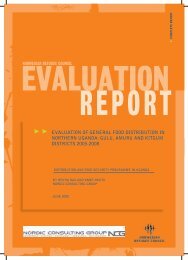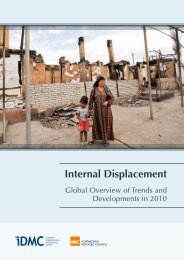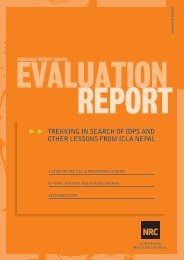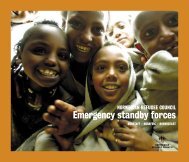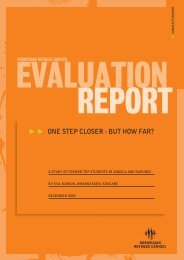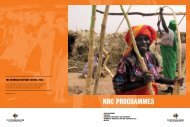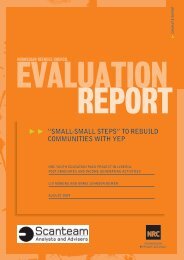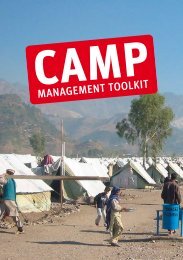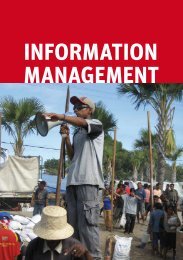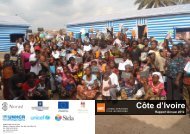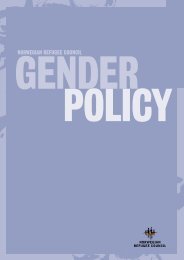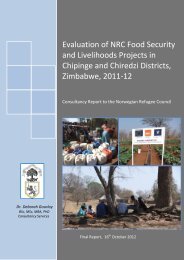Download report here - Norwegian Refugee Council
Download report here - Norwegian Refugee Council
Download report here - Norwegian Refugee Council
- No tags were found...
You also want an ePaper? Increase the reach of your titles
YUMPU automatically turns print PDFs into web optimized ePapers that Google loves.
Executive SummaryIn April 2009, the UN Secretary General underlined the centrality of the UNin providing mediation and mediation support in his <strong>report</strong> on enhancingmediation and its support activities. The Mediation Support Unit (MSU)within the UN Department of Political Affairs (DPA) serves as a central pillarto enhance and guide mediation efforts.Background of theMSU SBTThe Mediation Support Unit (MSU) Standby Team of Mediation Experts(SBT) project was established in April 2007. The project was originallysolely funded by the <strong>Norwegian</strong> Ministry of Foreign Affairs and based upona Memorandum of Understanding (MoU) between the United Nations andthe <strong>Norwegian</strong> <strong>Refugee</strong> <strong>Council</strong> (NRC). In the second year of the project,the European Commission also provided financial support to the team.The Standby Team of Mediation Experts is a specialised resource whichcan be rapidly deployed to the field upon a temporary basis in order toprovide technical advice to UN officials and others leading mediation andconflict prevention efforts. The SBT is managed by both the UN MSU andthe NRC to allow for flexible and rapid deployment, as well as to provide adegree of autonomy to the experts.SBT members are contracted full-time for a period of 12 months, thus atdisposal fully and at all times, and on standby to be deployed within 72hours for up to one month (renewable) to a specific location.Purpose andMethodology of theEvaluationNRC initiated the external evaluation in consultation with MSU. After atender was published in summer 2010, Dr Oliver Wils (Berghof PeaceSupport) and Dr Antje Herrberg (MediatEUr) were chosen for this task.The evaluation aimed at contributing to the improvement of mediationsupport services through taking stock of the lessons learned of the SBTproject and recommendations for improved practice. The evaluation wasbased upon the OECD criteria of relevance, effectiveness, efficiency andsustainability and focused upon three main areas:1) Management and support of the SBT project including co-operationand co-ordination between the NRC and the MSU/UNDPA.2) Outcome of the mediation support to a mediation effort provided bythe members of the Standby Team when deployed to the field.3) Conceptual development of the SBT project.During September and October 2010, the evaluation team conductedextensive desk research of background material provided by the NRCincluding all end-of-mission <strong>report</strong>s, statistics, contractual documents,relevant notes, memoranda and written communication as well asmanagement documents from the MSU. The team conducted 40background discussions and interviews with key stakeholders to the SBTproject in Oslo and New York as well as by telephone and Skype. A draftevaluation <strong>report</strong> was submitted at the end of November and the findingswere presented to NRC and MSU in Oslo on 15 December 2010.Main FindingsMediation Supportin the UN SystemTo date, t<strong>here</strong> is no single definition of mediation support. We considerUN mediation support to consist of two interrelated but also distinctareas of support which are a) support to a mediation team in the field; andb) support to a broader mediated peace process (advisory, logistical,financial and or assistance to the parties).The recent establishment of the MSU was accompanied by a number oforganisational challenges in a complex political environment. For thisi




